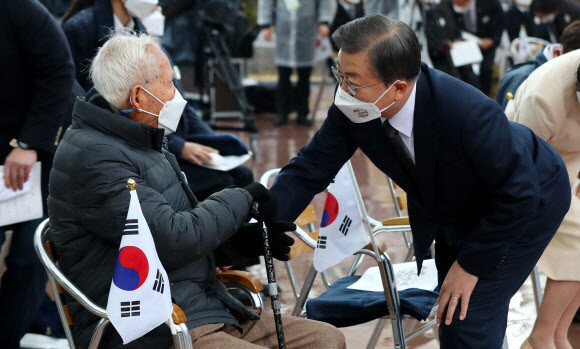
President Moon Jae-in greets independence activist Lim Woo-cheol and patriot governor at the March 1st anniversary ceremony held at Tapgol Park in Jongno-gu, Seoul on the morning of the 1st. yunhap news
President Moon Jae-in once again emphasized his willingness to improve Korea-Japan relations based on the’two-track’ stance of approaching historical conflict and other pending issues in a commemorative remark of March 1st. However, it did not come up with a’specific solution’ that Japan expected for’core issues’ such as the issue of forced mobilization victims and the ruling of compensation for the Japanese military’comfort women’. Even after the inauguration of US President Joe Biden, it will take a considerable amount of time for Korea-Japan relations to take off. President Moon’s commemoration of March 1 this year attracted great attention both at home and abroad as it was unveiled for the first time since the inauguration of US President Joe Biden, who has emphasized the improvement of Korea-Japan relations and the restoration of trilateral cooperation between Korea and Japan. However, it did not present Korea’s “both security” to resolve the issues that Japan has persistently demanded. Instead,’Two’, which simultaneously expresses the principle of “The Korean government will always seek wise solutions from a victim-centered standpoint” and “will not stop working for cooperation and future development between Korea and Japan.” The track’ keynote was confirmed again. President Moon reiterated the necessity of cooperation, saying that Korea-Japan cooperation will “help both countries, help in stability and common prosperity in Northeast Asia, and also help Korea-US-Japan trilateral cooperation.” did. Korea has a willingness to resolve the relationship between Korea and Japan, but it took the form of indirectly conveying to the Biden administration that it is not fulfilling its will due to Japan’s’rigid attitude’. After Prime Minister Yoshihide Suga took office in September of last year, the Korean government appealed that “I am ready to sit face to face and communicate with the Japanese government at any time”. They visited and expressed their intention to actively cooperate with the success of the Tokyo Peace Olympics. However, despite the appeased stance of Korea, Japan adhered to a rigid stance, saying, “Korea should create an opportunity to improve relations.” After a court ruling that the Japanese government should directly compensate the victims of comfort women on January 8, Prime Minister Suga and Foreign Minister Motegi Toshimitsu refused to meet with the new Korean ambassador to Japan, Kang Chang-il, and refused to respond to a telephone conference with Foreign Minister Eui-yong Eui-yong. Maintaining a cool attitude. In this situation, it seems that the Moon Jae-in administration has decided that it is not necessary to improve relations with Japan until it breaks the’victim-centeredism’, which is the grand principle of dealing with the issue of the past. Even if the two countries try to improve relations in the future, it is not easy to come up with an agreement. President Moon emphasized the joint efforts between Korea and Japan, saying, “If you face your head in a straightforward attitude, you can solve the past problems wisely,” but Japan said, “Korea is violating international law. Measures must be taken to correct this,” he said, calling for a one-sided concession from Korea. Even if we look at the domestic situation in Japan, it is difficult to negotiate seriously with South Korea due to political scandals such as Corona 19 and the issue of hospitality to officials from the Ministry of Internal Affairs and Communications of Prime Minister Suga’s eldest son. In the end, to resolve the relationship between Korea and Japan, the effectiveness of the COVID-19 vaccine will be confirmed as early as April to May, and countries will have confidence in quarantine, and the Biden government will disclose its North Korean policy to minimize uncertainty. It seems that there should be conditions that can be used as an opportunity for the’peace process’ to resume operation. This is because, when it is judged that Korea-Japan relations must be resolved first to improve inter-Korean relations and an opportunity for North Korea-US dialogue, the’justification of concessions’ arises for President Moon as well. Conversely, it also means that if we miss the moment of the Tokyo Olympics in July, it may be difficult to seize new opportunities for improving Korea-Japan relations within the term of President Moon until next May. By Gil Yoon-hyung, staff reporter [email protected]
